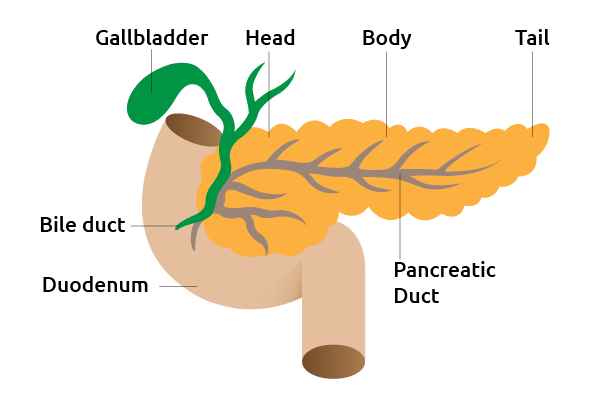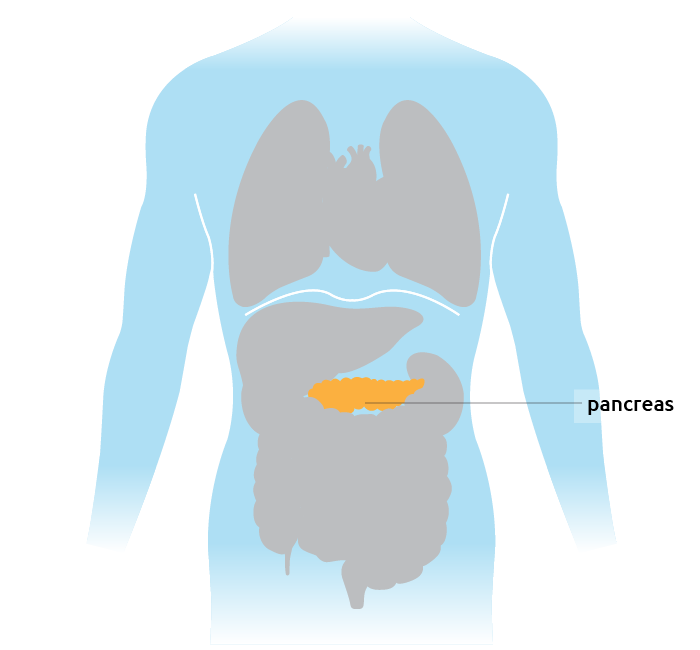Pancreas
Beneath your ribs, you’ll find the pancreas, an organ that works a lot like a personal health coach. This organ controls your sugar levels that releases the nutrients from your food to help keep you in the best possible shape.
How does the pancreas work?
The pancreas controls your sugar levels and produces a special juice that releases the nutrients from your food to help keep you in the best possible shape. The pancreas sits just behind your stomach. It breaks down the food you eat by making digestive enzymes.
The pancreas also controls the amount of sugar in your blood. Having too much or too little sugar can be life threatening, so the pancreas must stay on constant alert. After a big meal, the blood often becomes flushed with sugar. If blood sugar is low, the pancreas releases a hormone called glucagon that tells the body’s cells and liver to release stored sugars back into the bloodstream. The interplay between insulin and glucagon keeps our sugar levels balanced.
But a faulty pancreas can no longer coach us like this. If it’s weakened by disease, the pancreas has difficulty – or cannot – produce insulin. That can trigger a condition known as diabetes. Without regular insulin release, sugar steadily builds up in the blood, eventually hardening the blood vessels and causing heart attacks, kidney failure, and strokes. The same lack of insulin deprives cells of the energy-rich sugar they need to grow and function. People with diabetes also tend to have higher levels of glucagon, which makes even more sugar circulate. Without this internal health coach, our sugar levels would go haywire, and we wouldn’t be able to digest important nutrients.
Common pancreas diseases
Common diseases that may lead to transplantation include:About a pancreas transplant operation

Preparing for the hospital
Preparing for the hospital In preparing for your pancreas transplant surgery, use the following checklist to prepare for your procedure:
- Select your primary support person. Choose someone you feel close to who has the time, health, and flexibility to be your caregiver. You need to know you are not a burden to this person. For caregivers, follow this link for more information on caring for patients.
- Prepare a phone/email tree. This will make it easier for your caregiver to update friends and family while cutting down on phone or email volume.
- Organize your personal affairs. Consider filling out an advanced directive, writing a will, and sharing access to bank accounts, e-mail, or blogs with a trusted loved one. You may also need to fill out Family Medical Leave Act, insurance, or loan deferment paperwork.
- Consider dependent care. Find someone you trust and set up a plan to take care of your children and/or pets. Ask your doctor when you can expect to see your children and pets after your transplant.
- Arrange transportation. You will want to plan how to get to the transplant center quickly when you get the call that an organ is available. Be sure to make these arrangements well in advance. If you are relocating, make sure you make housing arrangements in advance.
- Pack your bags. You’ll need to be ready to leave as soon as you get the call that an organ is available. Include insurance information, a list of medications, an extra 24-hour supply of medication, and other necessities.

The procedure
Although it is possible for a living donor to donate a pancreas segment, most pancreas transplants involve a whole organ from a deceased donor. After the donor pancreas is removed, preserved and packed for transport, it must be transplanted into the recipient within twelve to fifteen hours. The pancreas transplant recipient is first given general anesthesia and is placed on a ventilator and an incision is made in the lower abdomen. The diseased pancreas is not removed during the operation. The donor pancreas is inserted in the lower portion of the patient’s abdomen and attached to their blood vessels, and intestine or bladder. The whole organ pancreas surgical procedure takes approximately two to four hours to complete. Because the length of this surgery is different for every patient, families should talk with the surgeon about what to expect.

During recovery
Postoperative care begins with a team of health professionals within the hospital. Careful, comprehensive post-surgical monitoring constantly evaluates whether the body is accepting the new organ. In addition, the amount of time you spend in the recovery room, waking up and getting to the point that you’re ready to go home, will vary from patient to patient. Because individual experience after recovery is so unique, it is important to discuss with your physician what to expect after surgery.


